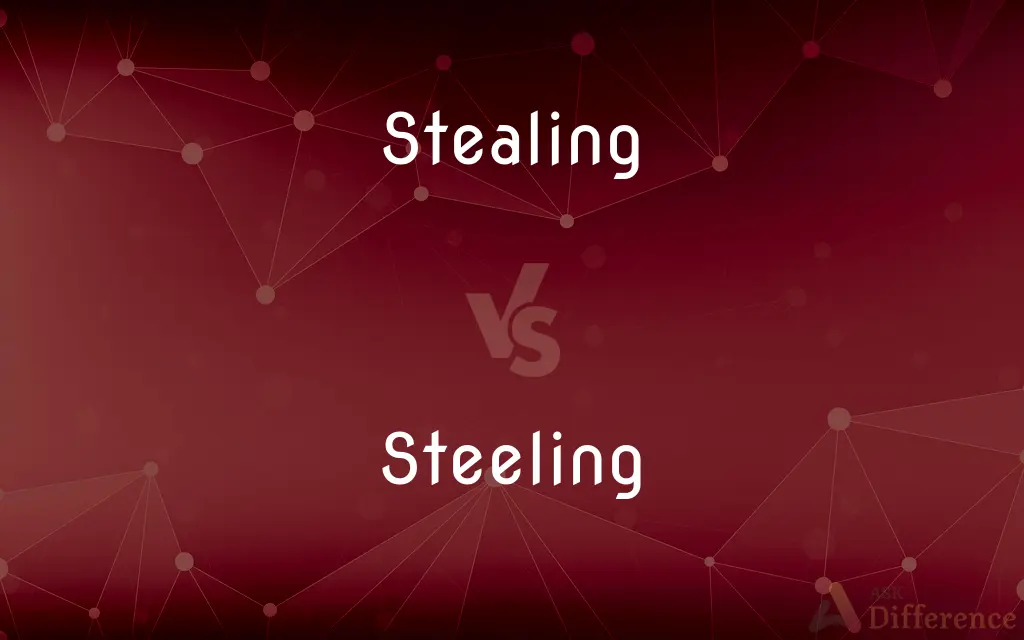Stealing vs. Steeling — What's the Difference?
By Fiza Rafique & Maham Liaqat — Updated on March 26, 2024
Stealing involves taking something without permission, while steeling refers to mentally preparing oneself for a challenge.

Difference Between Stealing and Steeling
Table of Contents
ADVERTISEMENT
Key Differences
Stealing is the act of taking something that doesn't belong to you without permission or legal right, often secretly or by force. On the other hand, steeling oneself involves mentally preparing for a difficult or stressful situation, enhancing one's resolve or courage.
While stealing is a crime that can lead to legal consequences, such as fines or imprisonment, steeling is a personal process, often seen as a positive step towards facing challenges with strength and determination.
The concept of stealing is universally understood as an unethical or illegal act, affecting both individuals and businesses. Conversely, steeling oneself is considered a necessary skill in various aspects of life, including professional, personal, and emotional challenges.
Stealing creates victims and can have a lasting impact on the individuals or entities from which something is taken. Whereas steeling oneself can empower an individual, enabling them to overcome obstacles and succeed in their endeavors.
The motivations behind stealing can range from need or greed to impulse or survival, showing a diverse range of human behaviors and societal issues. In contrast, the act of steeling oneself is driven by a desire to succeed or survive in the face of adversity, reflecting resilience and personal growth.
ADVERTISEMENT
Comparison Chart
Definition
The act of taking something without permission
Mentally preparing oneself for a difficult task
Legal Implications
Can result in criminal charges
None
Impact
Creates victims and loss
Empowers the individual
Motivation
Need, greed, or impulse
Desire for success or survival
Perception
Generally viewed negatively
Seen as positive and indicative of resilience
Compare with Definitions
Stealing
Often associated with theft, burglary, and robbery.
The police arrested him for stealing expensive jewelry.
Steeling
Mentally preparing oneself for a difficult or stressful situation.
He spent the night steeling himself for the tough conversation ahead.
Stealing
A criminal act that results in loss for the victim.
After stealing the car, the thief sold it for cash.
Steeling
A personal development process aimed at enhancing resilience.
Steeling herself before the race, she focused on her training and goals.
Stealing
Can have legal consequences, including fines or jail time.
She faced serious charges for stealing company funds.
Steeling
Used in situations requiring courage or endurance.
Steeling his nerves, the soldier prepared for the mission.
Stealing
Viewed negatively in society and by the law.
Stealing from anyone, regardless of their wealth, is unjustifiable.
Steeling
Considered a positive and proactive approach to adversity.
Steeling your mind against fear can help you achieve your dreams.
Stealing
Taking something that doesn't belong to you without permission.
The act of stealing from a store can lead to arrest.
Steeling
Leads to personal growth and better handling of challenges.
By steeling herself against criticism, she improved her performance.
Stealing
To take (the property of another) without right or permission.
Steeling
A generally hard, strong, durable, malleable alloy of iron and carbon, usually containing between 0.2 and 1.5 percent carbon, often with other constituents such as manganese, chromium, nickel, molybdenum, copper, tungsten, cobalt, or silicon, depending on the desired alloy properties, and widely used as a structural material.
Stealing
To present or use (someone else's words or ideas) as one's own.
Steeling
Something, such as a sword, that is made of steel.
Stealing
To get or take secretly or artfully
Steal a look at a diary.
Steal the puck from an opponent.
Steeling
A quality suggestive of this alloy, especially a hard, unflinching character.
Stealing
To give or enjoy (a kiss) that is unexpected or unnoticed.
Steeling
Steel gray.
Stealing
To draw attention unexpectedly in (an entertainment), especially by being the outstanding performer
The magician's assistant stole the show with her comic antics.
Steeling
Made with, relating to, or consisting of steel
Steel beams.
The steel industry.
A bicycle with a steel frame.
Stealing
(Baseball) To advance safely to (another base) during the delivery of a pitch, without the aid of a base hit, walk, passed ball, or wild pitch.
Steeling
Very firm or strong
A steel grip.
Stealing
To steal another's property.
Steeling
Of a steel gray.
Stealing
To move, happen, or elapse stealthily or unobtrusively
He stole away for a quiet moment. The deadline stole up on us.
Steeling
To cover, plate, edge, or point with steel.
Stealing
(Baseball) To steal a base.
Steeling
To make hard, strong, or obdurate; strengthen
He steeled himself for disappointment.
Stealing
The act of stealing.
Steeling
Present participle of steel
Stealing
(Slang) A bargain.
Steeling
A strengthening with, or as if with, steel.
Stealing
(Baseball) A stolen base.
Stealing
(Basketball) An act of gaining possession of the ball from an opponent.
Stealing
(uncountable) The action of the verb to steal, theft.
Stealing
That which is stolen; stolen property.
Stealing
Present participle of steal
Stealing
The act of taking feloniously the personal property of another without his consent and knowledge; theft; larceny.
Stealing
That which is stolen; stolen property; - chiefly used in the plural.
Stealing
The act of taking something from someone unlawfully;
The thieving is awful at Kennedy International
Stealing
Avoiding detection by moving carefully
Common Curiosities
What does stealing mean?
Stealing is the act of taking something without permission, considered a criminal offense.
Can anyone be a victim of stealing?
Yes, anyone can be a victim of stealing, as it involves taking something that belongs to another person or entity without permission.
What are the common motivations behind stealing?
Motivations can range from need or greed to impulse or survival.
How does steeling oneself help in difficult situations?
Steeling oneself helps by enhancing mental resilience and preparing an individual to face challenges with courage.
Are there any legal consequences for steeling oneself?
No, steeling oneself involves mental preparation and does not have legal implications.
What impact does stealing have on businesses?
Stealing can lead to financial loss, reduced employee morale, and a tarnished brand reputation for businesses.
Can steeling oneself impact mental health?
Yes, it can positively impact mental health by building confidence and reducing anxiety in the face of challenges.
Is steeling a skill that can be developed?
Yes, steeling is a skill that involves mental preparation and can be developed with practice and experience.
How is the act of stealing viewed by society?
Stealing is generally viewed negatively by society and is considered unethical and illegal.
Can steeling oneself have a positive impact on one's life?
Yes, steeling oneself can lead to personal growth, better resilience, and success in overcoming challenges.
Can stealing ever be justified?
Ethically, stealing is rarely justified, though some argue in cases of extreme need or survival.
What is the difference between stealing and borrowing?
Stealing is taking without permission, whereas borrowing implies permission and the intention to return the item.
Is there a legal defense for stealing in desperate situations?
In some legal systems, necessity may be considered a defense, but it heavily depends on the circumstances and jurisdiction.
How can one practice steeling themselves?
Practicing mindfulness, visualization, and facing smaller challenges can help build resilience.
Is steeling oneself necessary for everyone?
While not necessary for everyone, it can be beneficial for those facing significant challenges or stress.
Share Your Discovery

Previous Comparison
Robber vs. Thief
Next Comparison
Conn vs. ConAuthor Spotlight
Written by
Fiza RafiqueFiza Rafique is a skilled content writer at AskDifference.com, where she meticulously refines and enhances written pieces. Drawing from her vast editorial expertise, Fiza ensures clarity, accuracy, and precision in every article. Passionate about language, she continually seeks to elevate the quality of content for readers worldwide.
Co-written by
Maham Liaqat















































